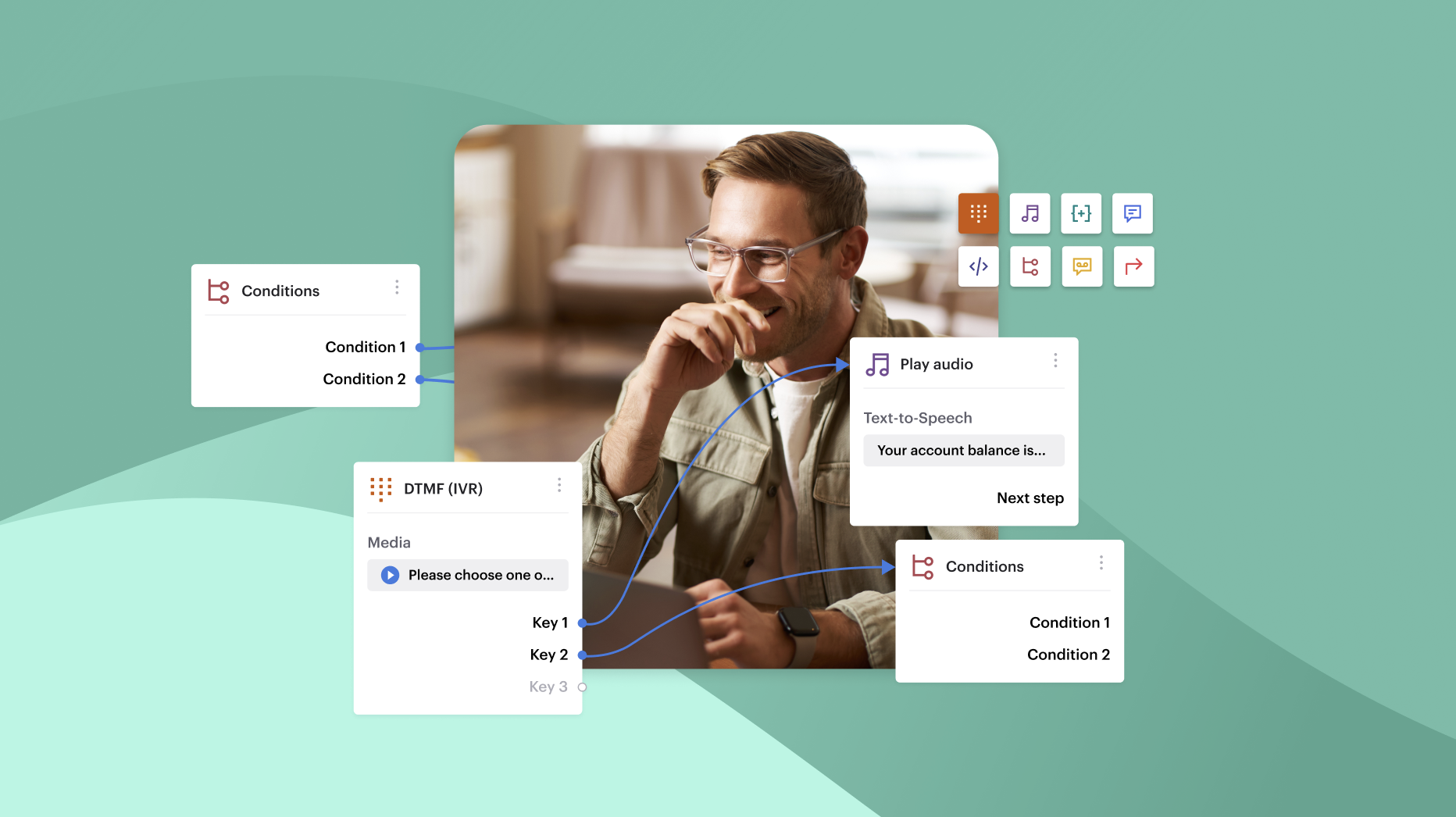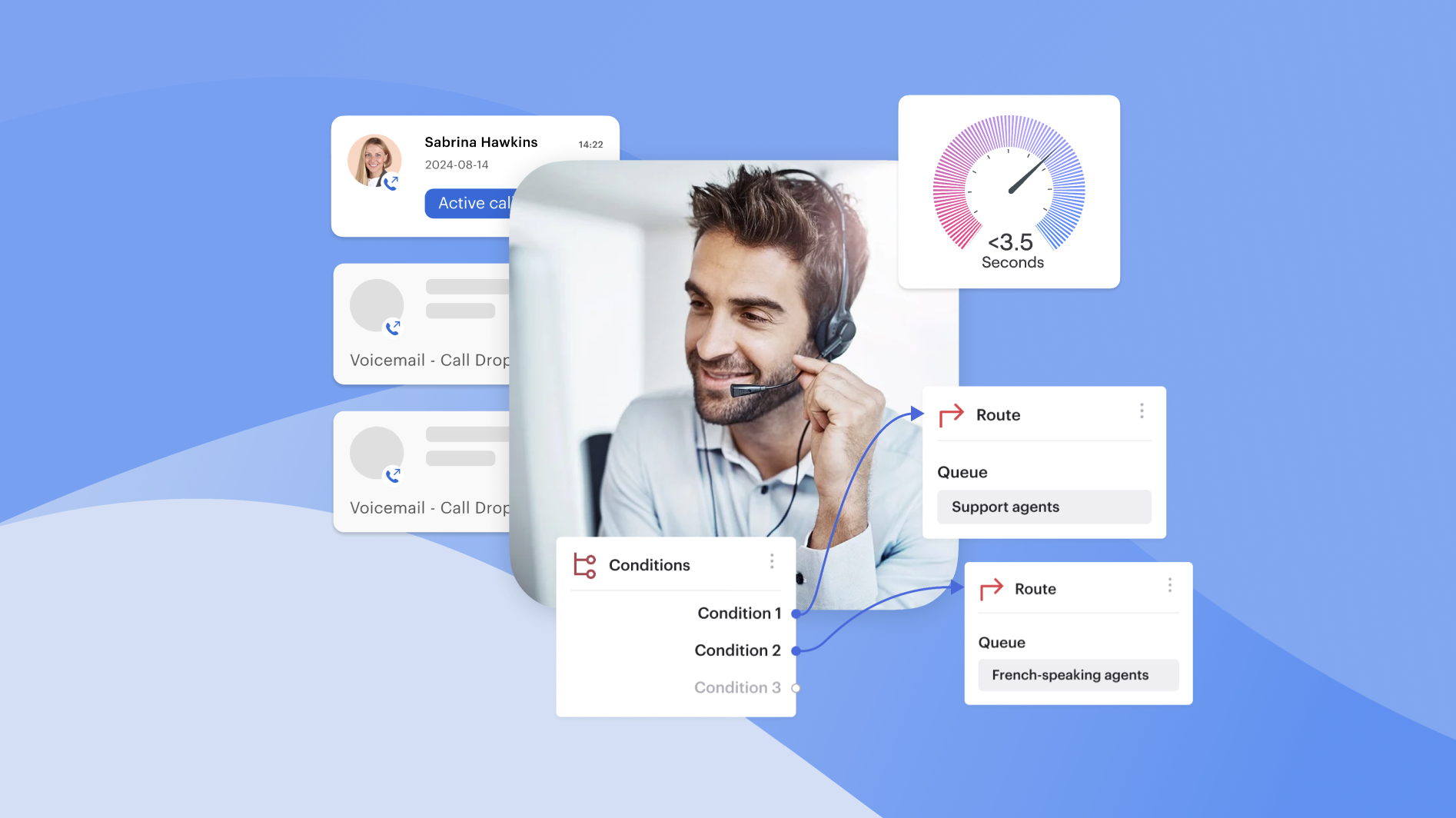The call center industry involves a lot of weighing risk against reward; but regulatory compliance isn’t something to gamble with. Every industry has its levels of compliance, laws and mandates that need to be strictly followed, and depending on the industry, one call center may be more challenging to run than another.
But one thing remains constant: failure to adhere to regulations results in lawsuits, fines, damage to reputation and decreased customer trust.
Takeaways
- Call center compliance ensures strict adherence to laws and regulations, protecting customer data, avoiding fines, and maintaining brand trust.
- Non-compliance can lead to financial penalties, reputational damage, operational disruptions, higher turnover, and customer churn.
- Key regulations include PCI DSS for payment security, GDPR for personal data privacy, HIPAA for healthcare information, TCPA for telemarketing, FDCPA for debt collection, and CFPB oversight for financial services.
- Each regulation has specific requirements, from data encryption and access control to consent management, record-keeping, and consumer protection measures.
- Implementing compliance measures involves targeted employee training, strong internal policy frameworks, and regular internal and external audits to ensure adherence.
- Continuous monitoring and updates to policies and procedures are essential as regulations evolve and new risks emerge.
- Compliance not only mitigates legal and financial risks but also builds customer trust and loyalty in a competitive marketplace.
- Technology, including call center software with compliance features, can automate monitoring, data protection, and adherence to regulatory standards.
What is Call Center Compliance?
The laws differ between countries, but in a nutshell: call center compliance entails the strict adherence to rules and regulations set by a governing authority or by the organization itself. It means being in complete accordance with any applicable laws and regulations.
Digital communication has exploded in recent years, with online security seeing a particularly dramatic change. Data privacy and consumer protection has become significantly more advanced as a means of shielding consumers from intrusive solicitation.
Because of this, call centers have had to adapt their procedures and systems in line with these compliance laws. But thanks to sophisticated call center technology, many compliance tasks have been automated.
Why is Call Center Compliance Important?
Without strict compliance to applicable laws, call centers would face constant fines, lawsuits and reputational damage. Customers need to be protected against data breaches, which are all too common nowadays.
But with a large volume of customer calls and interactions happening on a daily basis, even the strictest of guidelines have their weak spots. Identity theft, hacking and unauthorized access to personal data make protecting customers’ information a core responsibility for call centers.
Risks Of Non-Compliance
Non-compliance can mean multiple things for different businesses:
- Financial fallout: Penalties, fines and legal action that threaten the financial stability of the business.
- Less customer trust: Long-term reputational damage and poor customer trust in your brand.
- Operational disruptions: Increased downtime and disruptions to service that result in lost revenue.
- High turnover rates: Agents might turn to more reputable companies that value data protection.
- Elevated churn: Damaged reputation and poor security measures may lead to customers switching to a competitor.
Essential Regulations for Call Center Compliance
Payment Card Industry Data Security Standard (PCI DSS)
The PCI DSS was established in 2004 by five major credit card providers: Visa, Mastercard, Discover, JCB and American Express. It’s a security standard for companies that accept, process, store and transmit credit card data. Compliance is mandatory for major credit card providers, making PCI DSS essential for maintaining security.
It consists of six major goals, each with its own individual requirements:
1. Build and maintain a secure network
- Install a strong firewall: Properly configure barriers that protect cardholder data.
- Require strong, unique passwords: Accept only robust passwords, avoiding vendor-supplied defaults.
2. Protect cardholder data
- Safeguard stored data: Use encryption to protect cardholder information that’s stored on your servers.
- Secure data in transit: Encrypt card data when transmitted over open networks.
3. Maintain a vulnerability management program
- Use and update antivirus software: Keep systems safe from malware by regularly updating antivirus programs.
- Maintain security systems: Keep operating systems and applications up-to-date with the latest security patches.
4. Implement strong access control measures
- Limit access to sensitive data: Allow only employees who need it for their roles access to cardholder information.
- Assign unique IDs: Give each user a distinct identifier code to improve accountability.
- Control physical access: Restrict entry to systems holding sensitive cardholder data.
5. Regularly Monitor and Test Networks
- Track and monitor all access: Use logging mechanisms to monitor who’s accessing network resources and cardholder data.
- Conduct regular vulnerability scans: Test your security system on a regular basis to find vulnerabilities.
6. Maintain an Information Security Policy
- Establish a strict security policy: Develop clear policies, security guidelines and best practices for all employees.
General Data Protection Regulation (GDPR)
The General Data Protection Regulation act was implemented in May 2018 by the European Union. It’s the strictest security and privacy law in the world.
The GDPR protects personal data by issuing a fine of up to €20 million, or 4% of the businesses turnover, if it breaches the laws. Its main goal is to give consumers control over their personal information and hold companies accountable for the way they handle it. The GDPR must be strictly adhered to by all online websites attracting EU visitors, regardless of whether or not they offer products or services in Europe.
It encompasses seven key principles:
1. Lawfulness, Fairness, and Transparency
- Lawfulness: Data processing must have a legal basis, such as direct consent from the individual, necessity for a contract, or a legal obligation.
- Fairness: All data subjects must be treated fairly and not misled about the use of their data.
- Transparency: Organizations must provide clear, accessible information about how they process people’s data.
2. Purpose Limitation
Companies can collect personal information only for specific, legitimate purposes that are made clear to the user during collection. This data can’t be used for any other reason unless explicitly consented to by the user.
3. Data Minimization
Organizations can only collect data that’s necessary for the intended purpose, and nothing else. Companies should constantly assess what they collect to avoid accumulating excess, unnecessary data.
4. Accuracy
Companies have to take reasonable steps to keep personal data accurate and up-to-date. And people always have the right to request corrections to inaccurate data.
5. Storage Limitation
Personal information shouldn’t be kept longer than necessary and organizations should have retention periods after which the data is deleted.
6. Integrity and Confidentiality
Organizations must have appropriate technical measures in place to ensure data security and protect it from unauthorized access or loss, including encryption, access controls and constant security assessments.
7. Accountability
Organizations should have appointed data controllers who can demonstrate GDPR compliance with the necessary documentation, assessments and records of processing activities.
Health Insurance Portability and Accountability Act (HIPAA)
The HIPAA is a US federal law enacted in 1996 that protects the privacy of patients’ medical information. It’s the national standard for health data protection, enforced by the US Department of Health and Human Services (HHS) and is essential for any call centers working in the healthcare industry.
The HIPAA act covers the use and disclosure of protected health information to ‘covered entities,’ which are any organizations that handle this kind of data. Its contents essentially protect individual health information and give people the rights to understand and control how their data is used.
HIPAA enables information use while protecting patients’ privacy by allowing only necessary access to health information by those requesting it, such as doctors and healthcare providers, ensuring high quality healthcare and protected public health.
There are certain administrative requirements that covered entities need to have in place:
- A privacy official or Chief Privacy Officer who’s primarily responsible for developing and implementing policies and procedures.
- Training programs for employees and volunteers based on the established policies and procedures.
- Appropriate administrative, technical and physical safeguards to protect the privacy of personal health information (PHI).
- A process for individuals to make complaints about policies and procedures.
- If PHI is unlawfully disclosed, the offending entity must limit any harmful effects.
HIPAA covers three key areas:
1. Privacy rule
The Privacy Rule protects all health information about patients, including health status, provision of healthcare and any healthcare service payments about a person. It regulates who’s allowed to access and disclose personal health information without patient consent. But it’s also important in granting patients access to their own health records and requesting corrections for inaccuracies.
Any covered entities like healthcare providers and insurers are required by rule to protect individuals’ health information from improper disclosure.
2. Security rule
Any electronically stored PHI requires administrative, physical and technical measures to safeguard data confidentiality, security and integrity with secure access controls, encryption, regular audits and proper staff training.
3. Breach notification rule
In the case of data breaches or unsecured PHI, organizations must notify both the affected individual and the HHS within 60 days of discovering the breach.
Telephone Consumer Protection Act (TCPA)
Enacted in 1991, the Telephone Consumer Protection Act (TCPA) was designed to deal with increasing amounts of intrusive telemarketing calls and unsolicited faxes in the U.S. It imposes strict regulations on telephone solicitations, such as automated dialing systems and pre-recorded messages.
Companies must get explicit consent from consumers before contacting them. Plus, they have to respect the National Do Not Call Registry (DNC list). Any violations by companies of TCPA can lead to consumer lawsuits, making it essential for all telemarketing businesses to follow its rules.
Its key areas include:
1. Consent requirement:
Businesses must get permission from individuals before they make any form of automated or pre-recorded calls. In the case of telemarketing, permission has to be in writing. Informational calls like emergency alerts are less strict, but still require approval in many circumstances.
2. Do Not Call Registry:
People have the right to add their phone numbers to the national DNC registry, preventing telemarketers from calling them. Telemarketers are required to check the DNC registry regularly to ensure they don’t contact any listed numbers.
3. Restrictions on timing and content:
Telemarketing calls are only allowed to be made between 8am and 9pm local time of the person receiving the call. Plus, using automated or pre-recorded voice messages is prohibited unless prior consent has been obtained.
4. Fines:
Violating the TCPA can lead to fines of up to $1,500 for each breach, making it costly for businesses who risk non-compliance.
Fair Debt Collection Practices Act (FDCPA)
The Fair Debt Collection Practices Act (FDCPA) is a US federal law enacted in 1978 that regulates third-party debt collectors. It sets limits on how and when collectors can contact people, aiming to prevent abusive, deceptive, and unfair practices.
The law restricts the times of day collectors can reach out, as well as capping the number of contacts in a specific time period. It offers protection from harassment by allowing individuals the right to sue both collection agencies and collectors for damages and attorney fees if violated.
Key areas include:
1. Prohibited conduct
Under the FDCPA, debt collectors are prohibited from harassing or abusing individuals while collecting their debts. This includes any tactics like threatening, using obscene language, or calling excessively. They’re also not allowed to make false claims by pretending to be attorneys or law enforcement officers. And they can’t misrepresent the amount owed or falsely threaten legal action if the debt isn’t paid.
2. Validation of debts
A debt collector is required to provide written notice within five days of contact about the amount of debt, creditor’s name and all steps to be taken by the consumer if they want to dispute the debt.
3. Restrictions on communication
Debt collectors aren’t allowed to contact consumers at inconvenient times or locations, such as before 8am or after 9pm, without prior consent. Plus, they’re barred from workplace contact with consumers unless they have explicit permission. If a written request to stop communication is filed, debt collectors have to comply.
4. Consumer rights
Consumers have the right to dispute a debt by requesting verification and receiving detailed information about the debt. Plus, they can report any violations of the FDCPA to the Federal Trade Commission (FTC).
Consumer Financial Protection Bureau (CFPB)
The Consumer Financial Protection Bureau (CFPB) is a U.S. regulatory agency established in 2010 that controls financial products and services for consumers. Its goal is helping consumers to make informed financial decisions and protect them against predatory companies and malpractices.
The CFPB enforces rules, supervises financial institutions, and promotes fairness and transparency in the marketplace. It educates the public about abusive practices, making sure financial laws are being followed by companies.
Its key areas include:
1. Regulation of financial services
The CFPB regulates and enforces consumer protection laws for financial products like mortgages, credit cards and loans. It oversees various financial institutions including banks, mortgage lenders and payday loan companies.
2. Consumer complaints
The agency provides a platform for consumers to submit complaints about financial products and services. It investigates any issues, holding companies accountable for complaints related to mortgages, credit cards and banking.
3. Consumer education
The CFPB provides informative educational resources about credit scores, loans and budgeting. It also focuses on financial literacy for vulnerable groups, such as low-income families or students.
4. Enforcement and rulemaking
It creates and enforces rules that ensure compliance with consumer protection laws. It can even impose penalties for violations, file lawsuits and issue orders to stop illegal practices.
Implementing Compliance Measures in Your Call Center
Targeted Training Initiatives
Call centers must implement regular, targeted training programs to remain compliant with HIPAA, PCI DSS, GDPR and any other governing regulations relevant to the company’s industry.
This means that all employees must be educated on any laws that affect their job roles. Agents handling payment data should be fully trained on PCI DSS, while patient information handlers should be well versed in HIPAA. Training should include roleplay scenarios, how to handle sensitive information, security protocols and anything else that could endanger customer’s data.
And it’s essential that employees are able to recognize signs of phishing or data breaches, with clear guidelines on steps to take in case of violations.
Strong Policy Framework
A strong policy framework is non-negotiable in ensuring compliance across the board. It should consist of detailed internal policies that reflect legal regulations and best practices for data protection, consumer privacy and communication restrictions.
Policies have to address not only how personal data is collected, but how it’s stored, transmitted and discarded. Plus, they must specify the steps for incident responses, escalation protocols and disciplinary actions for non-compliance. These policies should be regularly updated and made available to all employees.
Consistent Compliance Reviews
Ongoing reviews and audits are essential to make sure policies are being correctly followed. It’s important for call centers to schedule regular internal audits, review call logs, data access records and security measures.
Plus, external audits might still be necessary for keeping up with industry compliance standards like PCI DSS or HIPAA. Compliance software tools can also help with monitoring data flows by detecting any potential issues.
Continuous improvement is the key: feedback from these audits should result in constant updates to policies and training initiatives.
The Bottom Line
Call center compliance is an essential part of maintaining the integrity and trust of both the industry and your customers. Regulations continue to evolve, which means customer expectations change every day. Call centers need to remember that prioritizing laws such as HIPAA, PCI DSS, GDPR and TCPA is crucial to protecting consumer data and ensuring fair practices.
By implementing targeted training programs, establishing robust policy frameworks and conducting regular compliance reviews, companies can ensure compliance and stay on the right side of the law. This way, call centers can avoid financial and reputational damage while fostering an environment of customer trust and loyalty in an increasingly competitive marketplace.
Talk to us today to find out how our powerful call center software can help your business remain compliant.





